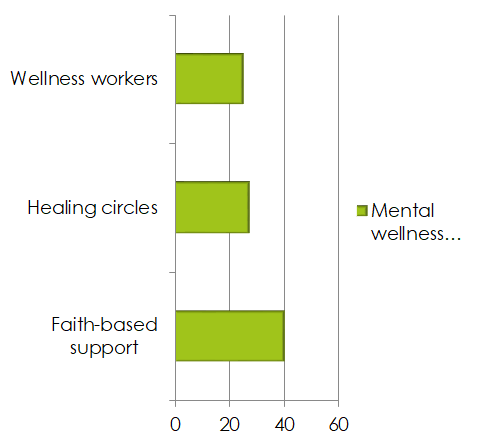Evidence-based Information: Nunavik Healing Support Data
 Interesting research from Nunavik, Northern Quebec, shows that Nunavimmiut use a range of strategies to cope with mental wellness: mainly adults over 30 years old.
Interesting research from Nunavik, Northern Quebec, shows that Nunavimmiut use a range of strategies to cope with mental wellness: mainly adults over 30 years old.
Young people, like Inuit in Nunavut, seek support from their peers rather than support from community healers, psychologists or doctors, though they are the group most at risk.
CSWs in Nunavik communities have developed community-based projects on substance use, healing and mental health, and Quebec is a leader in suicide prevention strategies.
Promote mental health and social skills in the early years of primary school
Inuit love of children is longstanding. While there are significant historical issues that have disrupted healthy parenting and bonds, Inuit traditional knowledge and messages on how to build strong resiliency and coping skills in children includes:
- Raise the self- esteem of our children;
- For CSWs, work on positive mental health awareness projects
- Reduce school violence, bullying and lateral violence to promote harmony and living together.
Early intervention
Major depression is associated with a high level of disability. Identifying and dealing with depression early results in better health outcomes for youth and adults
- Engage the right kind of professional help
- Inuit Elders advise that when people feel overwhelmed, sad or isolating themselves to:
- Talk therapy – talk to someone you trust about problems
- Change your thoughts – envision a positive future and forward thinking
- Get outside into nature – be active
- Focus on helping others
- Believe in yourself
Learn traditional skills – pride in Inuit self- identity and inclusion
Provide opportunities for individuals to belong.
It is vital for mental wellness and healing that there is meaningful inclusion in our families, community, work and social life, regardless of age or ability. This is cross-cutting across all cultures. Humans are social animals. We cannot survive emotionally without others in healthy ways. There are positive norms with clear rules for behaviour, expectations, values and morals, but with trauma, it is important to know how behaviours can be coming out because of anxiety or fear or memories. Fundamentally it is important to provide those we work with with opportunities for a role model; skill building and integration with people who are safe and nonjudgmental, either in family, school and community. Connecting with individuals for meaningful relationships is key. Finally, identifying a goal of hope and hopefulness can provide a Northern star of meaning and purpose.

Provide intensive support to families
- Research shows that when the following conditions are present in our community or environment, individuals are best positioned to thrive.
- Support families from the moment of pregnancy through to child’s early years
- Reduce neglect and strengthens attachment
- Reduce developmental problems
- Support positive learned behaviour along Inuit societal values
- Physical and psychological safety
- Appropriate structures that provide programs that are predictable and continuous – are not random or one-offs

Copyright © All Rights Reserved



